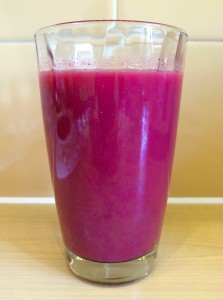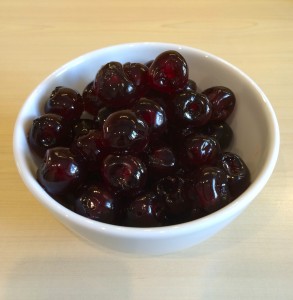When I was a child, one of my favourite things about my parents’ parties was Babycham. No, not for the drink, I hasten to add – though I did like the cute fawn-with-a-blue-bow motif and the bubbles – but for the cherries on sticks that accompanied it. And then there was the occasional treat of my mother’s homemade cherry pie, whose divine taste could have lured a siren off a rock.
Then I went to live in Moscow and discovered Russians love cherries as much as I do. They are available everywhere, and in everything from juices to jams, and pies to pasta, such as the fabulous Ukrainian dishes of vareniki and pelmeni.
Even better, cherries there are as cheap as chips, almost twice the size, and don’t run out, unlike two British supermarket chains I could mention. Tut tut.
As well as tasting fabulous, I have always been convinced that cherries are excellent for boosting and healing the skin. Then seeing plenty of sprightly babushkas buying cherry juice at the supermarket and skipping off down the aisles further convinced me that cherries were ambrosia in the battle to stave off illness and old age degeneration.
So I was delighted to read an article in the Mail Online that claimed drinking cherry juice was “as good as medication” in helping to lower blood pressure. This is apparently because it is rich in phenolic acids, which are natural antioxidants.

Super-fruit juice: the potent antioxidants in cherries could benefit hypertension, gout and wrinkles
Scientists claim that, in one study, people who drank 60ml of a cherry concentrate mixed with water saw their blood pressure drop by 7 per cent within three hours. This was enough to reduce the risk of a stroke by 38 per cent, or heart disease by 23 per cent – and similar to those patients who take blood pressure drugs.
To put this in context, high blood pressure affects around five million people in England alone – almost a tenth of the entire population.
If left untreated, it increases the risk of heart attack, heart failure, kidney disease, stroke and dementia. It costs the NHS billions, while the human cost is incalculable. And it’s certainly worth the investment of a handful of cherries.
Such fruitful knowledge is not new. Cherries have been used in folk medicine for centuries to treat arthritis, gout and rheumatism. A little research also confirms they are rich sources of flavonoids, which provide the deep red colour and are also potent antioxidants.
These soothe inflammations and benefit gout by reducing uric acid levels. One nutritional therapist recommended 225g/10oz of fresh cherries every day to prevent attacks of gout. I shall ask my father to test that particular treatment.
Finally, these flavonoids also protect collagen and help prevent wrinkles, as I had happily suspected for years. So, I shall now return to my cherry smoothie with extra anticipation. And return to the supermarket tomorrow for their much-anticipated delivery.


Comments are closed.